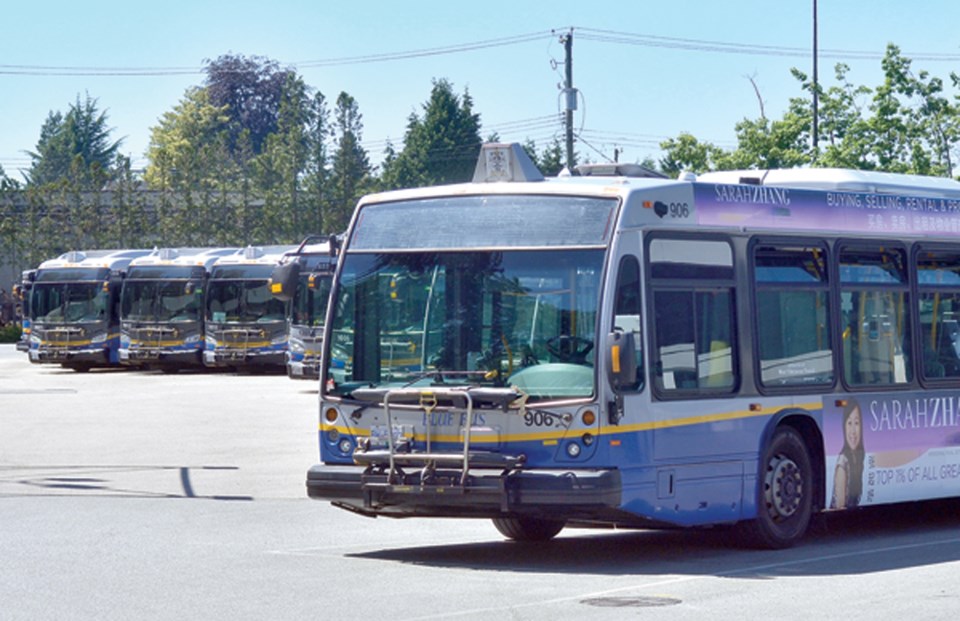A labour dispute between the District of West Vancouver and its Blue Bus drivers and mechanics is starting to impact service levels for transit riders.
The Amalgamated Transit Union local 134’s 150 members began job action on Saturday (July 23), following at 99-per-cent strike vote earlier in the week. Currently, the union has banned its members from working overtime and drivers and mechanics now report to work wearing their union T-shirts, not their Blue Bus uniforms.
According to the district, about 12 per cent of the scheduled service had to be cancelled on Monday. Most of the service cuts were on the 255 Dundarave-Capilano University and 250A Horseshoe Bay-Downtown routes. When deciding which runs will be cancelled, dispatchers may choose to reduce frequency on well-served routes or cancel service on quieter ones entirely, said district spokesperson Donna Powers. Overtime is regularly used to cover vacation time, increased service for peak demand periods, delays due to traffic congestion and sick time.
As of Monday, ATU local 134 president Cornel Neagu said only two mechanics were on the job instead of the usual six. That meant 40 per cent of the Blue Bus fleet was parked, waiting for required maintenance before buses could be put back on the road.
And it appears things are going to get worse before they get better.
Neagu accused the district of calling the Blue Bus’s contingent of part-time drivers and encouraging them to come in and cover shifts.
“From the union perspective, this is escalation of our conflict. It’s hostile,” he said. “They are desperate to cover the work. They don't want to cancel anything.”
If that continues, Neagu said it may lead to a full work stoppage.
“We are ready to serve the 24-hours’ notice to labour board and our employer and we are ready to go on strike. I don't want to do that,” he said. “I was confident a week ago that I can reach an agreement with my employer without going on full strike. Now my confidence, it's less than 50 per cent.
Powers, meanwhile, said the union and the district have an agreement not to call on part-time staff.
At issue in the labour dispute are wages for the 40 shuttle bus drivers in the union and guaranteed break times written into the schedule following each complete run. The ATU says TransLink’s Coast Mountain Bus Co. shuttle drivers are paid $3.30 more per hour than Blue Bus shuttle drivers.
Guaranteed scheduled breaks are a “strike issue” for the members because it’s a matter of health and safety, and because they are the ones who catch the brunt of frustrations from passengers when the buses get behind schedule, said John Callahan, ATU International vice-president.
The union’s contract with West Vancouver expired in March. The two sides have not been in negotiations since June 15 when the district negotiator presented an offer that included a five-per-cent raise for skilled trades, three per cent for other transit employees and a greater increase for the shuttle bus drivers, she said.
“The district's first offer was pretty close, and there’s certainly an opportunity to work through the issues but there hasn't been any counteroffer or anything,” Powers said.
Both sides expressed a desire to avoid a full-scale strike, although both also seem to be waiting for the other to make the next overture.
“We really hope it doesn't come to that. Work stoppages are a bit of a lose-lose,” Powers said.
Powers said the best way to keep track of whether or not your bus is running on time is to visit TransLink’s website or mobile app and check the service alerts. That has been a challenge for seniors who don’t carry smartphones, Powers conceded, so district staff have been fielding calls from transit users who don’t know how to check the live schedule.
The union local last went on full strike in 2016 for one day before a deal could be reached.
The Blue Bus typically carries about 18,000 passengers per day.



